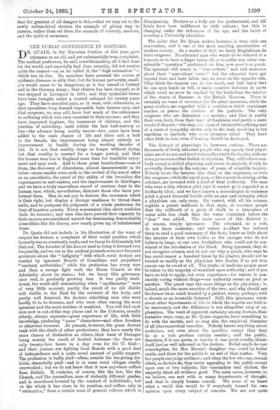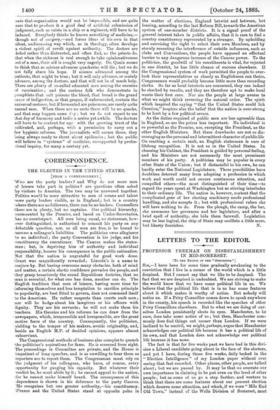THE PUBLIC CONFIDENCE IN DOCTORS.
"nR. QUAIN, in the Harveian Oration of this year, gave utterance to an old, and yet substantially true, complaint. The medical profession, he said, notwithstanding all it had done for the world, and especially had done recently, did not receive quite the respect—or, as he called it, the "high estimation "- which was its due. Its members have arrested the course of epidemic diseases so ably that, but for human perversity, small- pox would cease to be dangerous, as it has ceased in Ireland and in the German Army ; that cholera has been stopped, as it was stopped in Liverpool in 1884; and that typhoidal fevers have been brought under a control unhoped for twenty years ago. They have annulled pain, as it were, with chloroform, so that operations long deemed impossible have become easy, and that surgeons, we may add, have lost much of the callousness to suffering which was once essential to their success ; and they have improved hygiene, the treatment of children, and the practice of midwifery, until within the last half-century or less—the advance being mostly recent—two years have been added to the male chance of life and three and a half to the female, the improvement being almost entirely an improvement in health during the working decades of life. It is not that senility drags on longer without dying, but that senility is averted for a longer period, and that the human race has in England more time for healthful enjoy- ment and easy work. Add to these great benefactions—one of them, the discovery of chloroform, almost immeasurable in its value—some smaller ones, such as the revival of the use of ether as an anmsthetic, the proof of the utility of the bromides, the experiments in anti-septics, and the improvement in febrifuges, and we have a truly marvellous record of services done to the human race, which, nevertheless, distrusts those who have per- formed them. Men do not pay to doctors the reverence which is their right, but display a strange readiness to thrust them aside, and to postpone the judgment of a whole profession for that of hopeless quacks. Every nonsensical idea about medicine finds its votaries ; and men who have proved their capacity by their success are considered narrow for denouncing demonstrable absurdities like the theory, now nearly given up, of infinitesimal doses.
Dr. Quain did not include in his illustration of the want of respect for doctors a complaint of their social position which formerly was so constantly made, and we fancy he deliberately left that out. The founder of the Lancet used to bring it forward very frequently, and we see in the medical journals even now frequent murmurs about the "indignity" with which rural doctors are treated by ignorant Boards of Guardians and prejudiced "sanitary authorities ;" while the profession has every now and then a savage fight with the Horse Guards or the Admiralty about its status ; but we fancy this grievance, once real, is gradually growing less. It was partly tradi- tional, the world still remembering when " apothecaries " were of very little account, partly the result of an old dislike still visible in the East for the servants of the body, and partly well deserved, the doctors admitting men who were hardly fit to be dressers, and who were often among the most ignorant and the most reckless of mankind. You will find such men now in out-of-the-way places and in the Colonies, usually elderly, always separate—great experience of life, with little knowledge, producing " queer " characters—and often drunken or otherwise immoral. At present, however, the great doctors rank with the chiefs of other professions; they have nearly the same chance of distinction as others, their want of Peerages being mainly the result of limited fortunes—for there are only twenty-four hours in a day even for Sir W. Gull— and their juniors are fighting local Boards with a good deal of independence and a quite novel amount of public support. The profession is badly paid—often, outside the fee-giving ills-. trcts, shamefully paid—and is in some rural villages cruelly overworked ; but we do not know that it now anywhere suffers from disdain. It contains, of course, like the law, like the Church, and like journalism, men of violently different grades, and ia sometimes lowered by the conduct of individuals ; but on the whole it has risen to its position, and suffers only in "estimation," from a certain want of general culture, which is
disappearing. Doctors as a body are too professional, and till lately have been indifferent to wide culture ; but this is changing under the influences of the age, and the habit of securing a University education.
The point that Dr. Quain makes, however, is true, with one reservation, and is one of the most puzzling peculiarities of modern society. As a matter of fact, we fancy Englishmen do trust surgeons. No educated man who wants to be relieved of a tumour, or to have a finger taken off, or to suffer any other con- siderable " operation " performed on him, now goes to a quack. The ignorant still resort to " bone-setters," and talk nonsense about their " marvellous- cures ;" but the educated have got beyond that, and have fallen into an error on the opposite side. They think the surgeon can do too much, and half fancy that he can open heads at will, or make curative incisions in parts which could no more be reached by the knife than the interior of the statue of Rameses in the British Museum. There is certainly no want of reverence for the great operators, while the great oculists are regarded with a confidence which sometimes reaches or passes the confines of the pathetic. The only surgeons who are distrusted are aurists ; and that is partly their own fault, from their want of frankness, and partly a mere result of despair,—the deaf, con cioos of intolerable suffering and of a want of sympathy shown only to the deaf, resolving to try anything or anybody who even promises relief. They have often little to lose, even if hearing should be destroyed.
The distrust of physicians is, however, curious. There are thousands of fairly educated people who say openly that physi- cians are of no use, and trust to remedies which the faculty with one voice pronounce either foolish or injurious. They will believe any- body except a skilled physician, and resort to anybody if only be avowedly disregards the outcome of years of scientific inquiry. Nobody treats the lawyers like that, or the engineers, or even the surgeons; while the naval men, or the experts in mining, or the scholars, are invested with a kind of final authority. The man who runs a ship where a pilot says it cannot go is regarded as a foolhardy idiot; and we have known a mineralogist of eminence prick a grand financial bubble with an. ease and certainty which a physician can only envy. He cannot, with all his science, explode a patent medicine in that style, or convince people that the millionth of a grain of chalk in a wine-glass of water adds less chalk than the water contained before the " dose " was added. The main cause of this distrust is, of course, simply ignorance. The educated, as a rule, do not learn anatomy; and unless accident has induced them to read a good summary of the facts, know as little about the interior of their own bodies as the savages who do not believe in lungs, or our own forefathers who could not be con- vinced of the circulation of the blood. Being ignorant, they do not recognise science, and do not see why a quack, who says he has cured cancer a hundred times by his plaster, should not be trusted as readily as the physician who doubts if as yet true cancer can be cared at all. The truths of medicine proper must be taken by the majority of mankind upon authority ; and if you have no test to apply, not even experience—for nature is con- stantly curing without drugs—one authority seems as good as another. The quack says the same things as the physician ; is, indeed, much the more assertive of the two ; and why should not the former be as much trusted by a patient, weary, perhaps, with a chronic or an incurable distress? Still, this ignorance exists about other departments of life in which the experts are held to be sacrosanct, and the difference is not altogether easy of ex- planation. The want of apparent certainty among doctors, their tentative ways, may, as Dr. Quain suggests, have something to do with the matter, and so may also the empirical character of all pharmaceutical remedies. Nobody knows anything about medicines, not even about the specifics, except that they do as a rule produce certain results ; and the public, therefore, if it can quote, or fancies it can quote results, thinks itself just as well informed as the doctors. Boiled snails do cure consumption, for Mrs. Brown's daughter was cured by boiled snails, and there for the public is an end of that matter. Very few people can judge evidence ; and when the few who can, remain silent, as doctors do, they never appealing to the public except upon one or two subjects, like vaccination and cholera, the majority think all evidence good. The main cause, however, is, we believe, one met with in many departments of thought, and that is simply human conceit. We none of us koew what a world this would be if everybody formed his own opinion upon every subject of concern. We are not quite -sure that organisation would not be impossible, and are quite sure that to produce it a good deal of artificial submission of judgment, snub as exists in a ship or a regiment, will have to be induced. Everybody thinks he knows something of medicine,— 'though not of surgery,—and forms ideas of his own in that silent, undiscusaing way which, as in theology, often develops a violent spirit of revolt against authority. The doctors are defied rather than distrusted, and often find, as the priests do, that when the sickness is real enough to take opinionativeness out of a man, their aid is sought very eagerly. Dr. Quain seems to think that as science advances quackeries will die ; but we do 'not fully share his hope. If science advanced among the patients, that might be true ; but it will only advance, or mainly advance, among the doctors, and that will not be of much help. There are plenty of so-called educated men among the enemies of vaccination ; and the curious folk who demonstrate in pamphlets that salt poisons the blood, that bread is the grand cause of indigestion, or that grapes, if unfermented, contain the universal restorer, but if fermented are poisonous, are rarely quite unread men. When there are no sects there will be no quacks, and that may happen some d ty ; but we do not expect to see that day of harmony and tedium arrive yet awhile. The doctors will have to be content for age with the growing trust of the cultivated, and, perhaps, with a permission to carry out a few hygienic reforms. The journalists will secure those, they being always ready to shout about epidemics ; but the public will believe in "systems" of medicine, unsupported by profes- sional inquiry, for many a century yet.



































 Previous page
Previous page